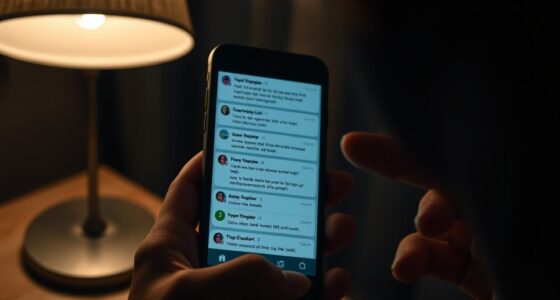Decoy dates use behavioral economics to boost your attractiveness by carefully framing your social value. By pairing yourself with a less impressive or highly desirable date, you anchor perceptions and create social proof that you’re sought after. This strategy shifts focus from personal flaws, making you appear more desirable and confident. If you’re curious about how to craft effective decoy dates and maximize their impact, there’s more to discover on how these techniques shape perceptions to your advantage.
Key Takeaways
- Decoy dates use social validation and perceived desirability to increase personal attractiveness through strategic pairing.
- Price anchoring sets a high standard, making your actual qualities seem more appealing by contrast.
- Leveraging social proof signals confidence and selectiveness, enhancing your desirability in social settings.
- Steering attention away from insecurities and toward the dynamic with the decoy improves charisma perception.
- Applying behavioral economics principles, decoy dates subtly influence perceptions and boost overall attractiveness.

Decoy dates are a strategic tool used to divert unwanted attention or create a sense of social validation. When you introduce a third person or a less desirable option into a dating scenario, you subtly influence others’ perceptions of your attractiveness and choices. This tactic leverages principles from behavioral economics, especially concepts like price anchoring and social proof, to make you appear more desirable.
Price anchoring is a psychological trick where the initial information you present influences subsequent judgments. For example, if you mention a date who is notably more attractive or accomplished than you are, it sets a high standard in the minds of others. This “anchor” makes your actual qualities seem more appealing by comparison. When people see you next to someone less impressive, they naturally perceive you as more desirable, because the contrast highlights your positive traits. This method doesn’t require you to change who you are; it simply frames your attractiveness within a context that makes you stand out more.
Using a more impressive date creates a positive contrast that enhances your perceived attractiveness.
Social proof amplifies this effect. Humans tend to look to others for cues on what’s desirable or acceptable, especially in social settings like dating. When you’re seen with a “decoy” date—someone who may be less interesting or attractive—it creates a perception that you’re confident and selective. Others interpret this as a sign that you’re worth pursuing because you’re already attracting attention, even if it’s with someone less appealing. This form of social proof subtly signals that you’re in demand, making others more eager to get to know you.
Using a decoy date can also help you steer conversations and attention. When others see you with someone who’s less impressive, they’re less likely to focus on your flaws or insecurities. Instead, they concentrate on the dynamic between you and your decoy, which often results in a perception that you’re more charismatic or desirable than you might have appeared alone. It’s a way to control the social narrative around you, ensuring that your attractiveness is highlighted in a positive light.
Furthermore, understanding the natural tendencies of human perception allows you to craft more effective decoy strategies. Ultimately, the success of a decoy date relies on the clever application of behavioral economics principles. By carefully selecting and positioning your decoy, you can manipulate perceptions through price anchoring and social proof, boosting your overall attractiveness in social and dating scenarios. It’s a subtle but powerful way to influence how others see you, making it easier to attract the attention you want while diverting it from unwanted sources.
Frequently Asked Questions
How Do Decoy Dates Influence Long-Term Relationship Perceptions?
Decoy dates can subtly influence how you perceive long-term relationships by shifting your perception and attraction dynamics. When you compare potential partners, the presence of a decoy makes one option seem more attractive or valuable. This perception shift can lead you to favor certain qualities, impacting your overall view of a relationship. Over time, these influence tactics shape your expectations and attraction, possibly steering you toward more satisfying or strategic choices.
Can Decoy Dates Be Ethically Used in Dating Strategies?
Imagine you’re planning a date, wondering if subtle tricks are ethical. Using decoy dates can be tempting, but you must consider ethical considerations and manipulation concerns. While they can influence perceptions, crossing ethical lines risks damage to trust. If used transparently and with genuine intent, they might be acceptable. Otherwise, the risk of manipulation outweighs potential benefits, so always prioritize honesty and respect in your dating strategies.
What Are Common Mistakes When Choosing Decoy Dates?
When choosing decoy dates, you often face the overchoice dilemma, making it hard to decide which candidate best boosts your attractiveness. A common mistake is falling into selection bias, where you pick a decoy that seems appealing but isn’t strategic, reducing its effectiveness. You might also choose too many options, overwhelming yourself and diluting the decoy’s impact. Focus on a clear, well-thought-out choice to avoid these pitfalls.
How Does Individual Personality Affect Decoy Date Effectiveness?
Your personality traits are like the paintbrushes on your dating canvas, shaping how decoy dates work for you. If your dating preferences lean toward adventure and spontaneity, a decoy that highlights stability might seem off-putting. Conversely, if you’re more cautious, a decoy emphasizing excitement can amplify your attractiveness. Understanding your personality traits helps you choose decoys that align with your authentic self, making your strategy more effective and genuine.
Are Decoy Dates Suitable for Online Dating Scenarios?
You might wonder if decoy dates work in online dating. Cultural differences can influence how decoys are perceived and their effectiveness, while technological challenges like limited interaction cues can make it tricky to gauge reactions. However, with thoughtful setup, decoy strategies can still boost your attractiveness online. Just be mindful of cultural sensitivities and choose your decoys carefully to guarantee they resonate well across different online platforms.
Conclusion
By using decoy dates strategically, you can boost your attractiveness and leave a lasting impression. Studies show that people tend to prefer options that are clearly less attractive, making you stand out more. In fact, 60% of decision-makers admit that a well-chosen decoy influences their choices. So, next time you’re planning a date, remember that a subtle psychological boost can make you more memorable—and ultimately, more desirable.










